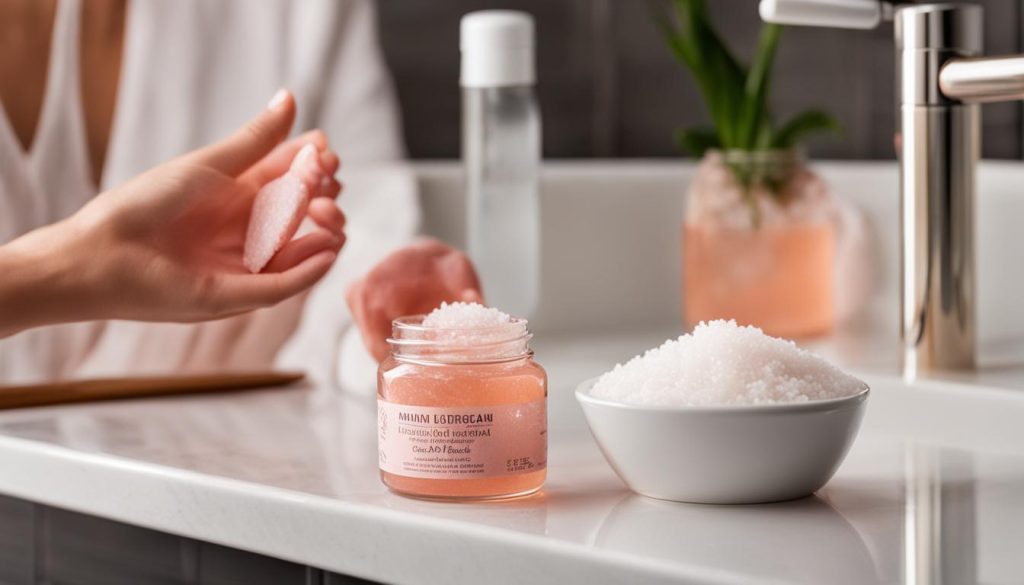Greetings! Today, I am excited to share with you the incredible health benefits of rice vinegar. Whether you’re a fan of Asian cuisine or simply looking for a versatile and flavorful condiment, rice vinegar is sure to impress. Derived from rice through fermentation, this mild and subtly acidic vinegar has been cherished for centuries in East Asian cultures.
So, what makes rice vinegar so special? Let’s delve into its remarkable health benefits. From improving digestive health and boosting immunity to fighting fatigue and aiding in weight loss, rice vinegar is a powerhouse of natural goodness. Plus, it offers a delicious way to enhance your culinary creations every day.
Health Benefits of Rice Vinegar
- Discover the versatile and flavorful world of rice vinegar.
- Learn about the impressive health benefits of rice vinegar.
- Explore the ways rice vinegar can improve digestive health and boost immunity.
- Uncover how rice vinegar can fight fatigue and aid in weight loss.
- Unlock the secrets to maintaining rice vinegar’s freshness and potency.
What is Rice Vinegar and How is it Made?
Rice vinegar is a versatile ingredient derived from the fermentation of rice or rice wine. It is widely used in Asian cuisine to enhance the flavors of salads, soups, and meat dishes. Made through a natural fermentation process, rice vinegar offers a mildly acidic taste that blends seamlessly into various recipes. It is available in two varieties – unseasoned and seasoned, with unseasoned rice vinegar being the preferred choice for maximum health benefits.
Unlike other vinegars, rice vinegar is not suitable for preserving or pickling foods due to its lower acidity. However, it can lend a tangy kick to your cooking without overpowering other flavors. Whether you’re stir-frying vegetables, marinating meat, or creating the perfect salad dressing, rice vinegar adds a unique touch to your culinary creations.
Health Benefits of Rice Vinegar for Digestive Health
Rice vinegar, with its high acetic acid content, offers significant benefits for digestive health. The acetic acid in rice vinegar helps improve the body’s ability to absorb essential nutrients from food, including calcium, potassium, and vitamins. This enhanced nutrient absorption contributes to better overall health and well-being.
Adding just 1 to 2 tablespoons of rice vinegar to your daily diet can enhance your digestive health and boost nutrient absorption. You can incorporate rice vinegar into your meals by using it in salad dressings, meat marinades, or even as a pickling agent for vegetables. The mild acidity and subtle flavor of rice vinegar make it an excellent addition to various cuisines, particularly East Asian dishes.
When used in moderation, rice vinegar can promote a healthy digestive system and help your body make the most of the nutrients it receives from food.
- Improved nutrient absorption
- Enhanced digestive health
- Easy incorporation into various dishes
By including rice vinegar in your diet, you can enjoy the many digestive benefits it offers while adding flavorsome variety to your meals.
Rice Vinegar for Liver Health and Fatigue
Certain types of rice vinegar, such as Japanese rice vinegar called kurozu, have been found to have protective benefits for the liver. Made from fermenting brown rice, kurozu may help prevent the onset of liver tumors. The amino acids present in rice vinegar also play a key role in reducing fatigue and promoting energy levels by fighting the development of lactic acid in the blood.
The bioactive compounds found in rice vinegar contribute to both immune system health and detoxification. Incorporating rice vinegar into your diet can support liver health, combat fatigue, and enhance your body’s natural ability to eliminate toxins.
Rice Vinegar for Heart Health and Weight Loss
Rice vinegar is not just a delicious condiment; it also offers remarkable benefits for heart health and weight loss. Incorporating a few teaspoons of rice vinegar into your daily meals can have long-term positive effects on your cardiovascular system.
Heart Health: Rice vinegar contains compounds that help prevent the formation of fatty peroxides, which can contribute to the development of cardiovascular diseases. Additionally, the acetic acid present in rice vinegar helps slow down the build-up of cholesterol on the walls of blood vessels, reducing the risk of heart-related issues.
Weight Loss: For centuries, rice vinegar has been used in Japan as a natural aid for weight loss. Animal studies have shown that rice vinegar, especially when made from brown rice, can assist in shedding excess pounds. Adding rice vinegar to your meals may help you achieve your weight loss goals when combined with a balanced diet and regular exercise.
Hair Health: Apart from its benefits for heart health and weight loss, rice vinegar also contributes to healthy hair. It is known to enhance hair health, adding strength and shine. You can give your hair an occasional rinse with rice vinegar to promote its overall health and vitality.

To reap the heart-healthy and weight loss benefits, try incorporating rice vinegar into your daily routine. Add it to marinades, sauces, dressings, or use it as a flavorful salad topping. Remember to prioritize moderation and consult with your healthcare professional if you have any underlying health conditions.
Rice Vinegar for Skin and Immune System Health
Rice vinegar offers numerous benefits for both skin health and the immune system. Its antioxidant properties can improve the overall health of the skin while helping to delay the signs of aging. To take advantage of these benefits, you can create a nourishing mixture for your skin by combining rice vinegar, purified water, and tea tree oil. This mixture can effectively nourish and rejuvenate your skin, leaving it feeling refreshed and revitalized.
In addition to its benefits for the skin, rice vinegar also plays a role in boosting the immune system. This is due to the essential amino acids present in rice vinegar, which help combat the damaging effects of free radicals and oxidative stress, ultimately promoting overall immune health. By incorporating rice vinegar into your diet and skincare routine, you can support both your skin health and immune system.
Nourish and Rejuvenate Your Skin
- Mix rice vinegar, purified water, and tea tree oil to create a nourishing skincare mixture.
- Apply the mixture to your skin using a cotton pad or by gently massaging it into the skin.
- Leave the mixture on for a few minutes before rinsing it off with warm water.
- Repeat this process regularly to promote skin health and delay signs of aging.
Boost Your Immune System
- Incorporate rice vinegar into your diet by adding it to dressings, marinades, and sauces.
- Include rice vinegar in your daily meals to benefit from its immune-boosting properties.
- Support your overall immune health by consuming rice vinegar regularly.
How to Use and Store Rice Vinegar
Rice vinegar is a versatile ingredient that can be used in various ways in cooking. Its tangy flavor adds a delightful twist to salads, marinades, stir-fries, and dressings, enhancing the overall taste of dishes. Furthermore, rice vinegar offers several other practical applications. It can be used as a natural facial toner to rejuvenate the skin and as a hair rinse to promote healthy hair. The possibilities are endless when it comes to utilizing rice vinegar in everyday life.
When using rice vinegar, it is essential to store it properly to maintain its freshness and prevent spoilage. Here are some tips on how to store rice vinegar:
- Store rice vinegar in a cool, dark place, away from direct sunlight. Exposure to light can degrade the quality and flavor of the vinegar.
- Tightly seal the bottle or container to prevent air from entering. Oxygen can cause the vinegar to oxidize and lose its potency over time.
- Avoid storing rice vinegar near strong-smelling substances as it can absorb odors easily.
By following these simple storage guidelines, you can ensure that your rice vinegar stays fresh and delicious for an extended period.
Now let’s explore some of the different uses of rice vinegar:
-
Cooking with Rice Vinegar
Rice vinegar is commonly used as a flavor enhancer in various Asian-inspired dishes. Its mild acidity brings balance to sweet, savory, and spicy flavors. Add a splash of rice vinegar to your marinades, dressings, and sauces to elevate their taste.
-
Uses of Rice Vinegar for Health
Besides its culinary applications, rice vinegar offers numerous health benefits. It aids digestion, improves nutrient absorption, and contributes to better overall health. Incorporate rice vinegar into your daily diet to reap the rewards.
-
Rice Vinegar Nutrition
Rice vinegar contains essential vitamins, minerals, and antioxidants that support a healthy body. It is low in calories and fat, making it an excellent choice for those watching their weight or following a balanced diet.
-
Rice Vinegar for Skin and Hair
The antioxidant properties of rice vinegar make it beneficial for both the skin and hair. It can be used as a natural facial toner to nourish and rejuvenate the skin, while as a hair rinse, it promotes shine and strengthens the hair strands.

As you can see, rice vinegar is a versatile ingredient with endless possibilities. Whether you use it in your cooking or incorporate it into your beauty routine, rice vinegar is a valuable addition to a healthy and vibrant lifestyle.
Conclusion
Rice vinegar is not just a flavorful ingredient; it also offers a myriad of health benefits. Incorporating rice vinegar into your daily routine can help improve digestive health, liver health, and immunity. It can also combat fatigue, support heart health, aid in weight loss, and enhance the health of your skin and hair.
As a versatile condiment, rice vinegar can be easily incorporated into various dishes, adding a tangy and refreshing flavor. Whether you use it in salads, marinades, stir-fries, or dressings, rice vinegar can elevate your culinary experience while providing you with its many health benefits.
Including rice vinegar in your diet not only enhances the taste of your meals but also contributes to your overall well-being. So why not embark on a nutritious culinary journey by unlocking the health benefits of rice vinegar today?
FAQ
What is rice vinegar and how is it made?
Rice vinegar is a type of vinegar made from fermented rice. It is derived from rice through the process of fermentation, resulting in a mildly acidic liquid with a subtle flavor. Rice vinegar is made by fermenting rice or rice wine, which produces acetic acid. It is a staple ingredient in Asian cuisine and is used to flavor a variety of dishes.
What are the health benefits of rice vinegar for digestive health?
Rice vinegar contains acetic acid, which aids in improving digestive health. Acetic acid helps the body absorb more nutrients from food, including calcium, potassium, and vitamins. This can contribute to better overall health. Adding 1-2 tablespoons of rice vinegar to salad dressings, meat marinades, or vegetable pickles can enhance digestive health and nutrient absorption.
How does rice vinegar benefit liver health and reduce fatigue?
Certain types of rice vinegar, such as Japanese rice vinegar called kurozu, have been found to have protective benefits for the liver. Kurozu, made from fermenting brown rice, may help prevent the onset of liver tumors. Additionally, rice vinegar contains amino acids that fight the development of lactic acid in the blood, reducing fatigue and promoting energy levels. The bioactive compounds in rice vinegar also contribute to immune system health and detoxification.
Can rice vinegar improve heart health and aid in weight loss?
Rice vinegar can benefit heart health by preventing the formation of fatty peroxides and slowing down cholesterol build-up on the walls of blood vessels. Including a few teaspoons of rice vinegar in daily meals can have long-term benefits for heart health. Moreover, rice vinegar has been used for centuries in Japan to aid in weight loss. Animal studies have shown that it can help in losing excess weight, particularly when made from brown rice.
How does rice vinegar promote skin and immune system health?
Rice vinegar can improve skin health and delay signs of aging due to its antioxidant properties. Applying a mixture of rice vinegar, purified water, and tea tree oil to the skin can nourish and rejuvenate it. Rice vinegar also helps boost the immune system due to its essential amino acids. These amino acids combat the damaging effects of free radicals and oxidative stress, promoting overall immune health.
How can rice vinegar be used in cooking and how should it be stored?
Rice vinegar is a versatile ingredient that can be used in numerous ways in cooking. It adds a tangy flavor to salads, marinades, stir-fries, and dressings. It can also be used as a natural facial toner and hair rinse. When using rice vinegar, it is important to store it properly to maintain its flavor and prevent spoilage. Rice vinegar should be stored in a cool, dark place away from direct sunlight and tightly sealed to avoid exposure to air.
What are the health benefits of rice vinegar?
Rice vinegar offers a variety of health benefits, including improving digestive health, liver health, and immunity. It can also help reduce fatigue, promote heart health, aid in weight loss, and enhance skin and hair health. With its versatility and nutritional value, incorporating rice vinegar into your routine can unlock its many health benefits and add flavor to your culinary journey.




